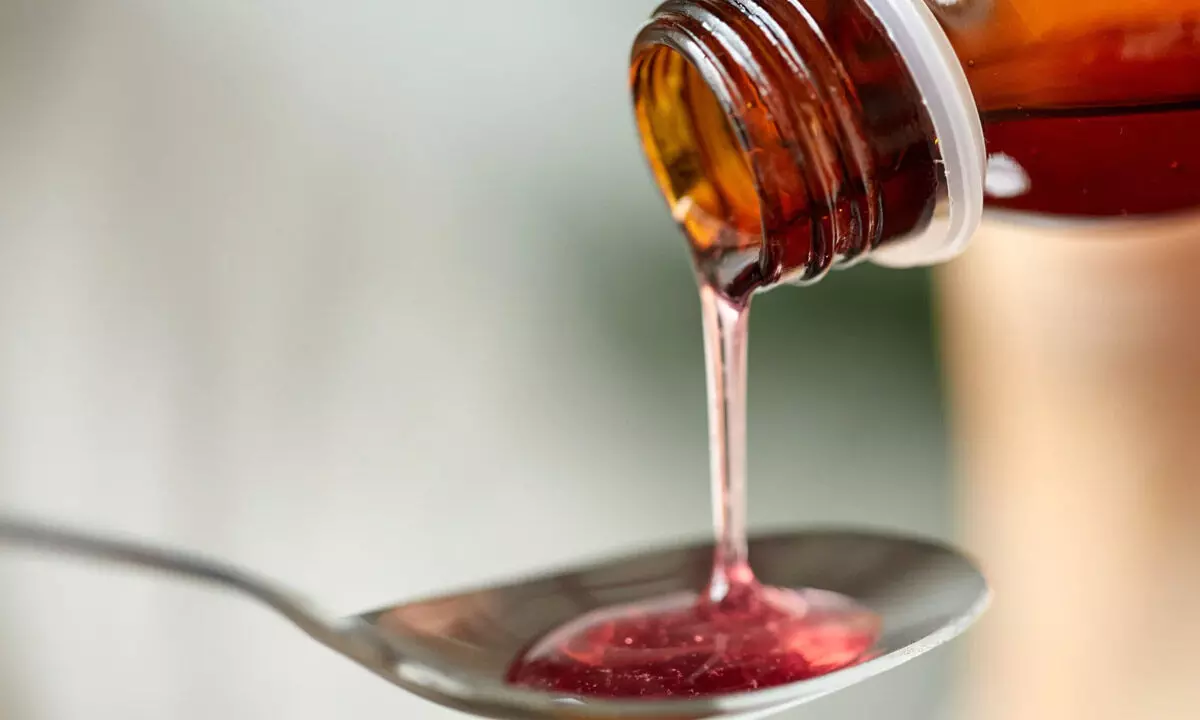Proposed ban on codeine-based syrups will adversely impact pharma industry
Instead of a blanket ban, a mechanism should be created for proper enforcement of the Drugs & Cosmetics Act and NDPS Act
image for illustrative purpose

The Union Ministry of Health and Family Welfare is seriously contemplating to ban distribution and sale of all codeine-based cough syrups in the domestic pharmaceutical market to curb misuse of these formulations as narcotics and intoxicants. The Health Ministry and several other government departments are now in discussion for the proposed ban.
Obviously, by banning distribution and sale of all codeine-based cough syrups in the domestic pharmaceutical market, the Health Ministry is aiming to stop of the misuse of these codeine-based formulations. According to a 2019 report jointly published by the Ministry of Social Justice & Empowerment and the National Drug Dependence Treatment Centre, AIIMS, India is home to 7.7 million people with opioid use disorders, of whom 2.5 million use pharmaceutical opioids. The most commonly prescribed opioids include codeine.
The Narcotics Control Bureau seized around 950,000 bottles of codeine-based cough syrups and 9.50 kgs of codeine phosphate from different locations in India last year alone. In recent years, the trend in northern Indian states like Uttar Pradesh, Madhya Pradesh, etc is that access to cheaper and low-potency natural opioids like opium/doda (poppy husk) is now very limited. This has forced people to look for alternatives in the form of either heroin or pharmaceutical opioids. Codeine was categorized as an 'essential narcotic drug' in May, 2015 under the Narcotic Drugs and Psychotropic Substances (NDPS) Rules. A total of 21.50 kgs codeine phosphate in codeine-based cough syrups was seized by Narcotics Control Bureau (NCB) from 2019 to 2021 as compared to about 1,50,735 kgs consumption of codeine phosphate in India during the same period, according to the data released by NCB. There is only 0.014 per cent of seizure of codeine in codeine-based cough syrups against the total codeine consumed in India in the last three years indicating the relatively marginal nature of the abuse problem.
Of course, the proposed ban on distribution and sale of all codeine-based cough syrups in the domestic pharmaceutical market will adversely affect the domestic pharmaceutical industry as a large number of pharmaceutical companies are involved in manufacturing these cough syrups. So, the industry associations have made representations to the government stating that these formulations are popular among medical professionals in managing post-operative cough, persistent dry cough in tuberculosis patients, and for managing cough in Covid-19 patients. Codeine is also a suggested drug in Adverse Drug Reaction (ADR) management to improve treatment compliance of drug resistant tuberculosis, according to Union Health Ministry's guidelines for Programmatic Management of Drug Resistant Tuberculosis in India, 2021.
The industry has appealed to the government that abuse should not be made a criterion for banning medically effective and clinically safe codeine-based cough formulations. The abuse angle needs to be effectively dealt with through appropriate regulations as per the NDPS Act, 1985 and by the enforcement agencies. The UN Conventions of 1961, 1971 and 1988 and the object of the NDPS Act, as stated in Section 4 mandates to prevent and combat the abuse of narcotic and psychotropic substances and the illicit traffic therein and at the same time, ensure their availability of medical and scientific use.
It is sure that the blanket ban on all the codeine-based cough syrups will jeopardize the interest of the patients at large as these cough syrups are indicated for several situations. Apart from that, the ban will jeopardize the livelihood of an estimated one lakh farmers in the northern states like Madhya Pradesh, Uttar Pradesh and Rajasthan who are dependent on poppy cultivation. These farmers have already been distressed for the last two years due to Covid-19 and the ban on codeine-based cough syrups will further kill their livelihood. Besides, with the proposed ban, there will be loss to the exchequer for approximately Rs. 300 crore (sales value of Codeine Phosphate API sold by GOAF, including GST).
The government's intention is good, but the data from a study conducted at National Institute of Mental Health & Neurosciences (NIMHANS), Bengaluru also showed that codeine is abused by 0.7 per cent of the study samples compared to 21 per cent related to alcohol. So, the government should not resort to completely prohibit the sale of codeine-based cough syrups simply based on an alleged abuse angle as it will adversely affect the interest of the patients in the country. Instead of a blanket ban, a mechanism should be created for proper enforcement of the Drugs & Cosmetics Act and NDPS Act.
(The author is a freelance journalist with varied experience in different fields)

